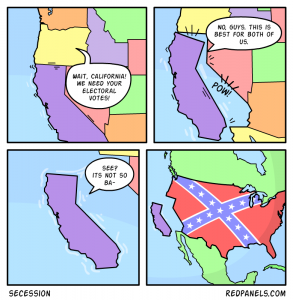There is a secession movement afoot in California. The cynic in me thinks that this issue was settled in 1865, but to many people, things are never settled until they’re settled in the way that they like.
What would this last election look like without California? To start with, we need to recalculate the Electoral College. As a refresher, the States select a number of Electors based on how many Representatives and Senators they have. To arrive at that count, each State gets two Senators and at least one Representative. Other Representatives are allocated according to the population of each State. Since 1941, the Method of Equal Proportions has been used to calculate how many Representatives are allocated to each State, with a limit of 435 for the entire country. Using the population figures that the Census Department used for allocation following the 2010 Census (pdf), what would happen if California was no longer a State? Assuming we keep 435 Representatives, here is how the Electoral College changes:
| State | Electors (with California) | Electors (without California) | Change |
| Alabama | 9 | 10 | +1 |
| Alaska | 3 | 3 | |
| Arizona | 11 | 12 | +1 |
| Arkansas | 6 | 7 | +1 |
| California | 55 | N/A | -55 |
| Colorado | 9 | 10 | +1 |
| Connecticut | 7 | 8 | +1 |
| Delaware | 3 | 4 | +1 |
| District of Columbia | 3 | 3 | |
| Florida | 29 | 32 | +3 |
| Georgia | 16 | 18 | +2 |
| Hawaii | 4 | 4 | |
| Idaho | 4 | 5 | +1 |
| Illinois | 20 | 23 | +1 |
| Indiana | 11 | 12 | +1 |
| Iowa | 6 | 7 | +1 |
| Kansas | 6 | 7 | +1 |
| Kentucky | 8 | 9 | +1 |
| Louisiana | 8 | 9 | +1 |
| Maine | 4 | 4 | |
| Maryland | 10 | 11 | +1 |
| Massachusetts | 11 | 12 | +1 |
| Michigan | 16 | 18 | +2 |
| Minnesota | 10 | 11 | +1 |
| Mississippi | 6 | 7 | +1 |
| Missouri | 10 | 12 | +2 |
| Montana | 3 | 4 | +1 |
| Nebraska | 5 | 5 | |
| Nevada | 6 | 6 | |
| New Hampshire | 4 | 4 | |
| New Jersey | 14 | 16 | +2 |
| New Mexico | 5 | 5 | |
| New York | 29 | 33 | +4 |
| North Carolina | 15 | 17 | +2 |
| North Dakota | 3 | 3 | |
| Ohio | 18 | 21 | +3 |
| Oklahoma | 7 | 8 | +1 |
| Oregon | 7 | 8 | +1 |
| Pennsylvania | 20 | 22 | +2 |
| Rhode Island | 4 | 4 | |
| South Carolina | 9 | 9 | |
| South Dakota | 3 | 3 | |
| Tennessee | 11 | 12 | +1 |
| Texas | 38 | 42 | +4 |
| Utah | 6 | 6 | |
| Vermont | 3 | 3 | |
| Virginia | 13 | 15 | +2 |
| Washington | 12 | 13 | +1 |
| West Virginia | 5 | 5 | |
| Wisconsin | 10 | 11 | +1 |
| Wyoming | 3 | 3 |
Thirty-four states get more Electoral Votes.
Looking at the popular and electoral vote totals (Retrieved from the election authority of each state, or, if that was not available, a large newspaper in the state capital on Wednesday, November 23, 2016):
| Popular Votes (Clinton) | Popular Votes (Trump) | Electoral Votes (Clinton) | Electoral Votes (Trump) | |
| With California | 122,364,488 | 120,634,627 | 232 | 306 |
| Without California | 114,504,641 | 116,511,641 | 196 | 340 |
There would have been an even stronger Electoral Vote landslide for Trump if California was not part of the Union. And not only that, he would have gotten a plurality of the popular vote. To sum up:








We can only hope
Secession Today, Secession Tomorrow, Secession Forever.
I’d insist on keeping the port of San Diego and enough land to bridge the gap from San Diego to Arizona. The U.S. needs a Pacific port for commerce and national security.
Let it go….
Let it goooooo…..
And this is exactly the reason why the national Democrat party would never allow California to secede. If California left, there would never again be another Democrat president, or even a Democrat majority in the House of Representatives.
A further consideration, if you will, of this secession idea is the various utlity needs the state has. If I am not mistaken, a lot of California’s water (at least in southern California, around LA) is piped in from other places.
If allowed to go off on its own, the country of California would more than likely tax itself out of existence within 10 years, as businesses, industries and even the wealthier citizens (movie stars, for example) leave California to avoid the higher taxation and regulatory fees which would necessarily be imposed to finance all of the state’s various social and environmental programs.
It would be an extremely foolish move on its part to secede, but I would say good riddance to bad rubbish.
DaveK, I think you’re right in that the national party wouldn’t like the consequences of California Dreamin’.
And I’m sure that the Trump administration would negotiate access to a Pacific port in exchange for the utilities.
It wouldn’t go that cleanly, of course. To borrow an old saying from our friends to the north: “If America is divisible, so is California.”
I doubt alll the Okies in Kern County would care to be ruled by a bunch of Godless Communists if they had a way of splitting off from them. Similarly, the coastal slither of Ecotopia would probably want nothing to do with a bunch of knuckledragging meat-eating rednecks. And of course Chicago, Boston, and New York City would probably start to get ideas of their own…
Splitting CA up would be a better option:
https://en.wikipedia.org/wiki/Six_Californias
But unlikely to happen because of the dilution of Democrat votes.
Why would the San Diego port be more special than say Portland or Seattle? Port of Portland was home to the Kaiser shipyards back during the WWII era. That is not insignificant. Is it the warmer temps? Just curious here. You guys are probably the best suited as to the pros and cons regarding this subject.
As long as they let the State of Jefferson go on their way out, vayo con Dios.
[…] 55 blue electoral votes and we probably would never face a Democrat threat to the presidency again. More thoughts on that were discussed here last year. Smaller states would get a bigger proportion of representation. All the illegals in California […]